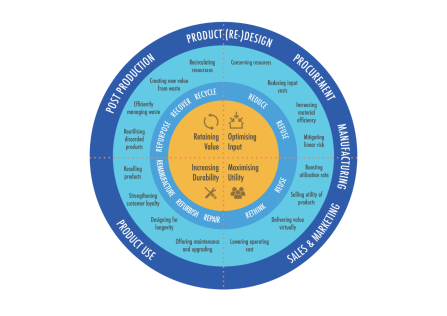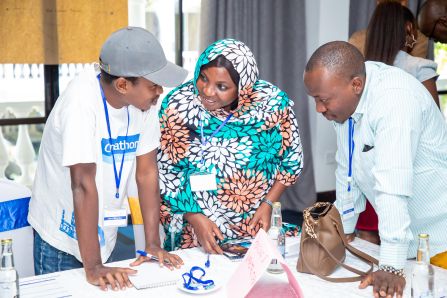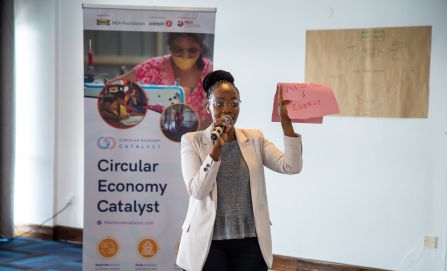2022: A Year of Catalysing Entrepreneurship in the Circular Economy
| Date |
Date
|
Since its official launch in June 2022, the Circular Economy Catalyst has been working to unlock the transformative potential of circular economy entrepreneurship in India and Kenya. With the support of the Ikea Foundation, the project works with over 180 circular entrepreneurs and over 50 local business development experts in both countries to foster economies that are restorative and regenerative by design.
Among the objectives of the CEC Incubation programmes is to contextualise the concept of Circular Economy and help participants identify circular business opportunities. To this end, the project team developed a taxonomy for circular business models to help guide participants towards considering circularity across different pathways and along the entire value chain. With the help of this compass for circular business models, workshop participants particularly enjoyed brainstorming on how to integrate Circular Economy principles into their businesses.

Replication support for circular entrepreneurs: CEC Replicator workshops
In order to accelerate and stimulate the ideation process of participants, the CEC Replicator Programme utilises proven circular economy business models which are showcased in four sector-specific workbooks and complemented by tools to support aspiring entrepreneurs to adapt and contextualize these ideas in their local markets. The CEC focus sectors are Textiles & Handicraft; Housing & Infrastructure; Water, Food & Energy and Electronics & ICT.
Across the four workshop cities in Bangalore, Jaipur, Nairobi and Mombasa, 88 entrepreneurs attended and successfully completed the trainings in 2022. Of those 88 participants 56% are female entrepreneurs and 55% are youth entrepreneurs (aged between 18-35 years). Within the workshops, participants were able to work on their business ideas and receive inspiration from successful circular entrepreneurs who complemented the expertise of local trainers in the realisation of the workshops.
Early-stage support for circular businesses: CEC Starter workshops
In 2022, CEC trained a total of 39 entrepreneurs from 20 teams in India, and 54 entrepreneurs from 24 teams in Kenya through the DESIGN and REFINE workshops of the Starter Programme. In an effort to enable and empower female entrepreneurship in the circular economy ecosystem, over 60% of those workshop participants in Mombasa and Nairobi, and Bangalore and Jaipur were women.
According to the participants of these workshops, the training conducted by CEC experts has a positive effect on their capacities to design and work on key business activities. Participants valued the support to create a lean business plan and noted an increased capacity in enterprise financial management. Circular entrepreneurs who joined the Starter workshops stated how the training had a positive impact on their capacities to evaluate value chains and design market entry strategies, among other key business activities.

“The workshop not only helped us to broaden our understanding of circularity but also enabled us to identify options through which we can bring circularity into our business”, says Eshan Sadasivan, participant of the CEC Starter workshops in India and Founder & CEO of ProSoc Innovators Pvt. Ltd.
Supporting business development experts to strengthen the ecosystem
Besides directly supporting circular enterprises, the Circular Economy Catalyst further engages in ecosystem building activities in order to build a sustainable and robust support system for circular enterprises in both Kenya and India. To this end, CEC trained Business Development Services (BDS) advisors over the course of 3-day workshops in its incubation toolkit methodology in Nairobi and New Delhi in June 2022. Across the two countries, 53 advisors participated in the Training of Trainers (ToT), of which 59% were female trainers and 41% were male trainers.
The objective of the ToT is to equip trainers with a tested and proven toolified training approach to efficiently support circular enterprises in order to maximise the impact of their training activities and to pave the way for circular enterprises to receive tailored support measures. Feedback provided by the participants indicates that among others, the level of expertise in providing technical expertise in the circular economy, in identifying circular economy enterprises and in designing support programmes for circular economy enterprises significantly increased during the workshop.
“The tools provide us with technical capabilities to infuse circular economy models in the enterprises successfully”, says Michael Kalo, from Loopwork Ventures and participant of the ToT in Kenya.
Further feedback indicates that a majority of participants were able to make new connections among themselves, further contributing to the establishment of a sustainable ecosystem for Circular Economy enterprises. The participants also enjoyed the introduction of Circular Economy-specific tools, such as the aforementioned taxonomy on circular business models and the Circular Economy compass.

Creating and measuring impact through the circular economy
Enterprises in the circular economy generate positive environmental, social, and economic impacts by developing market-based solutions that address key challenges in their communities. By supporting these businesses to start and scale their solutions, the Circular Economy Catalyst looks to multiply impacts such as quality job creation, the reduction of waste, and water-saving measures. Measuring these impacts is, however, far from easy. This year we took an in-depth look at how enterprises measure their impact, and where they continue to face challenges in doing so. With tools ranging from survey methods and lean data collection, to visualisation and impact reporting, our Circular Economy Enterprise Toolkits help enterprises to build the structures needed to track, analyse, and report on their impacts.
With the first impact assessment upcoming, we are looking forward to work with the enterprises and Business Advisors in our programmes to generate insights about how circular enterprises grow, what makes them successful and resilient, and how they are able to attract additional support for their growth journey. Keep in touch with us to be informed of our impact insights!
Coming soon in 2023…
The Circular Economy Catalyst will launch its first Awards in 2023. The Circular Economy Awards, in collaboration with SEED, aim to recognise the achievements of circular economy enterprises. Award recipients are eligible for participation in our Catalyser and Accelerator programmes which support high-achieving circular economy enterprises to scale-up and optimise their combined environmental, social and economic impacts.
As part of the ecosystem building activities, in 2023 the CEC Team will offer its first Practitioner Labs for Circular Economy Finance in Kenya. The Finance Labs engage financial institutions and other climate finance practitioners to advise on and design innovative climate finance products which are catered specifically to small and growing enterprises in the circular economy.
Stay tuned to our channels for more information coming soon!
